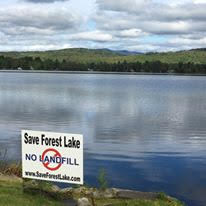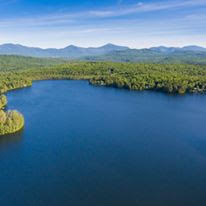Forest Lake State Park, one of the 10 original state parks, was created in 1935.
The park spans 397 acres and its 200-foot sandy beach lies on the shore of Forest Lake. Popular activities in the park include swimming, picnicking, mountain biking, fishing and boating. It is prime example of why people live, visit and appreciate New Hampshire.
Vermont-based Casella Waste Systems wants to put a landfill near Forest Lake and Forest Lake State Park, where 60 percent of the proposed landfill trash will be from out of state.
This project is not in the local town or region’s best interest.
Casella is looking to build a new landfill in Dalton, one proposed to have a 137-acre footprint, after Bethlehem voters twice rejected the company’s proposal to expand Bethlehem’s current 61-acre landfill district by another 100 acres. Casella will benefit greatly from this business opportunity.
People can presume Dalton will benefit from Casella’s proposed payment of $71million over 25 years to mitigate the trucking of trash to New Hampshire (for 40 years). But the long-term costs to the North Country are so much greater. And anyone who knows how to look at a balance sheet can understand that this is not a smart long-term economic deal.
What are the long-term costs and why do they pose a threat to our way of life in the North Country? Here are just five of many more examples:
- Wastewater runoff from a landfill can permanently damage a lake and its aquatic life. So much for dropping a line for some fresh lake trout.
- The environmental impact of a landfill will compromise the area, harming plants and wildlife. Do we really want to do that to our state parks?
- The toxic odors from the landfill will drive away anyone interested in leisure pursuits on the lake or its bucolic surroundings. It may also impact tourism dollars. Just ask our neighbors in Bethlehem. They will experience more trash truck traffic and it will increase in Whitefield and Littleton.
- A landfill will reduce property values for the hundreds homeowners around Forest Lake and throughout Dalton.
- Finally, a landfill in Dalton will set a precedent that New Hampshire’s North Country is for sale for environmentally destructive ventures.
We understand that trash needs to get disposed of.
The Mt. Carberry municipal trash facility in Berlin, N.H., exists for this purpose. Municipal facilities should be the way New Hampshire handles trash. In fact, Carberry plans to handle trash disposal for at least another 25 years.
So we already have one solution to the problem. We don’t need new landfills. But we also have to look at what we put into landfills like Carberry to make sure they last even longer.
The best way to manage our trash is to rethink what we put into it — from the garbage cans in our kitchens to garbage disposal in our landfills. Here’s a few thoughts on that topic:
- Let’s not put trash from out of state in our landfills. It’s bad practice that makes bad neighbors.
- Let’s be pragmatic. Why shouldn’t N.H. have a bottle bill, for instance? Redemption would take cans and bottles out of the trash and put money into state reserves for things like fish & game, search & rescue and park trail management. What’s more, with redemption you can always get your nickel back.
- Let’s be innovative. Modern science is turning fossil fuels plastics. It’s taking fewer fossil fuels out of the ground and putting plastics to work. Modern home design is giving new life to repurposed building materials. Modern manufacturing is turning denim into home insulation. The list goes on and on.
- Let’s protect our investments — our homes, our playgrounds, our livelihoods. Let’s create a larger municipal trash management approach, where the jobs and revenue stay in N.H. And we get to watch out for ourselves.
- Let’s protect our environment. It’s the only one we’ve got. There’s no PLANet B.
We need to preserve and protect the North Country. We need smart economic development, sound eco-tourism and safe waste management. We can’t let our backyards get turned into dumpsters for out-of-state trash.
We can’t jeopardize our environment and the tourism economy it generates. And we must work to manage our own trash infrastructure.
The North Country needs to stay unified in our priorities, and the best way to do that is to work on and pass a revamped House Bill 1319 (excluding the Appalachian Trail), tabled due to the pandemic, that would prohibit the siting of non-municipal landfills within two miles of a state park.
Support us on November 3rd, so we can continue to support New Hampshire’s proudest asset — our environment.
The North Country Democratic Caucus of the NH House of Representatives: Tim Egan – Grafton 2, Sue Ford – Grafton 3, Elaine French – Grafton 14, Linda Massimilla – Grafton 1, Denny Ruprecht – Grafton 15 & Jerry Stringham –Grafton 5.


